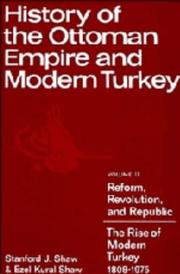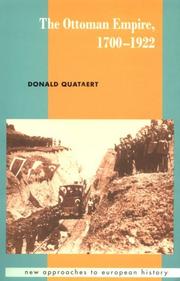| Listing 1 - 10 of 404 | << page >> |
Sort by
|

ISBN: 0521291666 0521214491 0511614977 0511096712 Year: 1977 Publisher: Cambridge : Cambridge University Press,
Abstract | Keywords | Export | Availability | Bookmark
 Loading...
Loading...Choose an application
- Reference Manager
- EndNote
- RefWorks (Direct export to RefWorks)
Reform, Revolution and Republic: The Rise of Modern Turkey, 1808-1975 is the second book of the two-volume History of the Ottoman Empire and Modern Turkey. It discusses the modernization of the Ottoman Empire during the nineteenth and early twentieth centuries, the spread of nationalism among its subject peoples, and the revolutionary changes in Ottoman institutions and society that led to the Empire's demise and the rise of the democratic Republic of Turkey. Based on extensive research in the Ottoman archives as well as Western sources, this volume analyzes the external pressures, reform measures, institutional changes, and intellectual movements that affected the heterogeneous Ottoman society during the Empire's last century. It concludes with an analysis of contemporary Turkey's constitutional and political structures and principal domestic and foreign problems.
Turkey --- History --- Ottoman Empire --- Ottoman Empire, 1288-1918 --- Arts and Humanities
Book
ISBN: 9048532736 9462982694 Year: 2018 Publisher: Amsterdam : Amsterdam University Press,
Abstract | Keywords | Export | Availability | Bookmark
 Loading...
Loading...Choose an application
- Reference Manager
- EndNote
- RefWorks (Direct export to RefWorks)
Homer's stories of Troy are part of the foundations of Western culture. What's less well known is that they also inspired Ottoman-Turkish cultural traditions. Yet even with all the historical and archaeological research into Homer and Troy, most scholars today rely heavily on Western sources, giving Ottoman work in the field short shrift. This book helps right that balance, exploring Ottoman-Turkish involvement and interest in the subject between 1870, when Heinrich Schliemann began his excavations in search of Troy on Ottoman soil, and the battle of Gallipoli in 1915, which gave the Turks their own version of the heroic epic of Troy.
Turkey --- Ottoman Empire --- History --- Turkey-History-Ottoman Empire, 1288-1918. --- HISTORY / General. --- Homer --- Influence. --- Annals --- Auxiliary sciences of history --- Troy, Homer, Heritage, Identity, Ottoman Empire. --- Ottoman Empire, 1288-1918
Book
ISBN: 9783111060392 311106039X 3111057801 Year: 2024 Publisher: De Gruyter
Abstract | Keywords | Export | Availability | Bookmark
 Loading...
Loading...Choose an application
- Reference Manager
- EndNote
- RefWorks (Direct export to RefWorks)
This first volume of Collected Works of the ERC Project TYPARABIC focuses on the history of printing during the 18th century in the Ottoman Empire and the Romanian Principalities among diverse linguistic and confessional communities. Although "most roads lead to Istanbul," the many pathways of early modern Ottoman printing also connected authors, readers and printers from Central and South-Eastern Europe, Western Europe and the Levant. The papers included in this volume are grouped in three sections. The first focuses on the first Turkish-language press in the Ottoman capital, examining the personality and background of its founder, İbrahim Müteferrika, the legal issues it faced, and its context within the multilingual Istanbul printing world. The second section brings together studies of printing and readership in Central and South-East Europe in Romanian, Greek and Arabic. The final section is made up of studies of the Arabic liturgical and biblical texts that were the main focus of Patriarch Athanasios III Dabbās' efforts in the Romanian Principalities and Aleppo. This volume will be of interest to scholars of the history of printing, Ottoman social history, Christian Arabic literature and Eastern Orthodox liturgy.
Book
ISBN: 3110675145 3110675099 Year: 2020 Publisher: Berlin ; Boston : De Gruyter,
Abstract | Keywords | Export | Availability | Bookmark
 Loading...
Loading...Choose an application
- Reference Manager
- EndNote
- RefWorks (Direct export to RefWorks)
Mit Hilfe der Untersuchung eines historischen Kadiamtsregisters soll die mikropolitische und -soziale Situation der nordmesopotamischen Stadt Mardin im 18. Jahrhundert genauer beleuchtet werden. Die vollständige Transliteration und Übersetzung des Kadiamtsregisters von Mardin 247 und der Versuch, anhand der thematisch weitgefächerten Texte die multiethnisch geprägte Region genauer zu untersuchen, liefert nicht durchweg Lösungen und Erklärungen, aber durchaus Einsichten, Anregungen und Bausteine für weitere Untersuchungen. Diese Arbeit stellt im nicht-türkischsprachigen Raum einen Meilenstein in der Untersuchung von osmanischen Quellen dar, die in jüngster Zeit vor allem im türkischen Raum stark vorangetrieben wird. Besonders im Bereich der mikrohistorischen Einordnung und systematischen Analyse der Quelle sind hier allerdings noch viele Lücken zu schließen. Als bemerkenswerte Neuerung in der Quellenforschung ist in dieser Arbeit die Prosopographie hervorzuheben, die einen wertvollen Beitrag zu weitergehenden biographischen Erkenntnissen liefert. Das Kadiamtsregister von Mardin 247 ist bislang einer umfassenden systematischen Untersuchung noch nicht unterzogen worden, womit die vorgelegte Untersuchung Originalität beansprucht. The complete transliteration and translation of the Cadi-Court minutes of Mārdin 247 and critical commentary on the text sources form the basis for the study of this Northern Mesopotamian city. Using statistical analytic methods, detailed case reviews, and brief prosopographies, the author reveals the 18th century micropolitical and micro-historical details of this multi-ethnic region.
LAW / Court Records. --- Cadi-court. --- Inventory. --- Ottoman Empire. --- Sicill.
Book
ISBN: 1108572332 1316257878 1108611249 1107108292 1107519209 Year: 2018 Publisher: Cambridge : Cambridge University Press,
Abstract | Keywords | Export | Availability | Bookmark
 Loading...
Loading...Choose an application
- Reference Manager
- EndNote
- RefWorks (Direct export to RefWorks)
Eunuchs were a common feature of pre- and early modern societies that are now poorly understood. Here, Jane Hathaway offers an in-depth study of the chief of the African eunuchs who guarded the harem of the Ottoman Empire. A wide range of primary sources are used to analyze the Chief Eunuch's origins in East Africa and his political, economic, and religious role from the inception of his office in the late sixteenth century through the dismantling of the palace harem in the early twentieth century. Hathaway highlights the origins of the institution and how the role of eunuchs developed in East Africa, as well as exploring the Chief Eunuch's connections to Egypt and Medina. By tracing the evolution of the office, we see how the Chief Eunuch's functions changed in response to transformations in Ottoman society, from the generalized crisis of the seventeenth century to the westernizing reforms of the nineteenth century.
Eunuchs --- East Africans --- Harems --- Harem --- Polygyny --- Africans, East --- Ethnology --- Men --- History. --- Turkey --- Ottoman Empire --- History --- Ottoman Empire, 1288-1918
Book
ISBN: 0191827339 0191088188 0191088196 Year: 2018 Publisher: Oxford : Oxford University Press,
Abstract | Keywords | Export | Availability | Bookmark
 Loading...
Loading...Choose an application
- Reference Manager
- EndNote
- RefWorks (Direct export to RefWorks)
In this original study, Will Smiley reassesses an aspect of the legacy of the Ottoman-Russian wars in the 18th century: both empires had a long history of slavery, but in the course of the 18th century they worked out a new regional international law that transformed captivity, introducing the concept of prisoners of war.
Prisoners of war. --- Turkey --- Russia --- History --- Exchange of prisoners of war --- POWs (Prisoners of war) --- War prisoners --- Prisoners --- Soviet Union --- Ottoman Empire --- Russo-Turkish Wars (1676-1878) --- 1288-1918 --- Ottoman Empire, Reign of (Turkey) --- Ottoman Empire, 1288-1918
Book
ISBN: 9789774166648 9774166647 Year: 2014 Publisher: Cairo ; New York American University in Cairo Press
Abstract | Keywords | Export | Availability | Bookmark
 Loading...
Loading...Choose an application
- Reference Manager
- EndNote
- RefWorks (Direct export to RefWorks)
Egypt; history; Ottoman Empire, 1517-1882.
Cultural relations --- Egypt --- Turkey --- Egypte --- Empire ottoman --- History --- Civilization --- Intellectual life --- Histoire --- Égypte --- Islamic Empire --- Ottoman Empire --- History. --- Ottoman Empire, 1288-1918

ISBN: 0521633605 Year: 2000 Publisher: Cambridge ; New York, NY : Cambridge University Press,
Abstract | Keywords | Export | Availability | Bookmark
 Loading...
Loading...Choose an application
- Reference Manager
- EndNote
- RefWorks (Direct export to RefWorks)
Turkey --- Ottoman Empire --- History --- Ottoman Empire, 1288-1918 --- TURQUIE --- EUROPE ORIENTALE --- ORIENT, QUESTION D' (BALKANS) --- HISTOIRE --- 18E-19E SIECLES --- 1288-1918 (EMPIRE OTTOMAN) --- 19E-20E SIECLES
Book
ISBN: 311065136X 3110655446 3110650789 Year: 2019 Publisher: München ; Wien : De Gruyter Oldenbourg,
Abstract | Keywords | Export | Availability | Bookmark
 Loading...
Loading...Choose an application
- Reference Manager
- EndNote
- RefWorks (Direct export to RefWorks)
Gerechtigkeit ist eine universelle Forderung von Gesellschaften in Vergangenheit und Gegenwart. Der Band versammelt Beiträge über die Voraussetzungen und Bezugssysteme der Forderung nach Gerechtigkeit, wie sie besonders in der Figur des gerechten Herrschers amalgamierten. Die Aufsätze behandeln unter anderem das muslimische Osmanenreich, die orthodoxe Moskauer Rus', das lateinische Christentum im Alten Reich sowie die konfessionelle Übergangszone Polen-Litauen. Im Unterschied zur älteren Fürstenspiegelforschung analysiert die historische Gerechtigkeitsforschung ihren Untersuchungsgegenstand im Umfeld von Weltordnung, Religion, Moral, Recht, Gewalt und Herrschaft, um dessen historischen Ort in Rhetorik und vollzogener Geschichte zu bestimmen. Justice is a universal claim in societies past and present. Using the examples of the Ottoman Empire, Muscovite Russia, Poland-Lithuania, the Holy Roman Empire and other territories, the volume investigates preconditions and frames of reference for this exhortation between the 15th and 17th century, as they coalesced in the figure of the just ruler.
Justice, Administration of --- History. --- Just rule. --- Ottoman Empire. --- Poland-Lithuania. --- Russia. --- early modernity.
Book
ISBN: 9781399525848 Year: 2024 Publisher: England : Edinburgh University Press Ltd,
Abstract | Keywords | Export | Availability | Bookmark
 Loading...
Loading...Choose an application
- Reference Manager
- EndNote
- RefWorks (Direct export to RefWorks)
Studies the intertwined manner in which Arabic and Turkish literatures took shape as national traditionsStudies Arabic and Turkish modernities in conjunction with each other within their shared Ottoman contextUndermines the prevalent view that Arabic and Turkish literatures merely modernised or Westernised in the nineteenth centuryMoves beyond the tendency in Middle Eastern studies to situate Arabic, Turkish and Persian works in a linear, chronological orderChallenges 'the influence paradigm', which proposes that Ottoman literature emerged under the influence of Arabic and Persian literatures before it modernised under the influence of French literatureStudies how pre-Ottoman poets such as al-Mutanabbī or Saʿdī became 'Ottomanised' in the works of the Ottoman literatiExamines how the Ottoman canon perpetuated exclusions in terms of gender, language and religionThe Ottoman Canon and the Construction of Arabic and Turkish Literatures fleshes out the Ottoman canon’s multilingual character to call for a literary history that can reassess and even move beyond categories that many critics take for granted, such as ‘classical Arabic literature’ and ‘Ottoman literature’. It gives a historically contextualised close reading of works from authors who have been studied as pioneers of Arabic and Turkish literatures, such as Ziya Pasha, Jurjī Zaydān, Maʿrūf al-Ruṣāfī and Ahmet Hamdi Tanpınar.The Ottoman Canon analyses how these authors prepared the arguments and concepts that shape how we study Arabic and Turkish literatures today as they reassessed the relationship among the Ottoman canon’s linguistic traditions. Furthermore, The Ottoman Canon examines the Ottoman reception of pre-Ottoman poets, such as Kaʿb ibn Zuhayr, hence opening up new research avenues for Arabic literature, Ottoman studies and comparative literature.
| Listing 1 - 10 of 404 | << page >> |
Sort by
|

 Search
Search Feedback
Feedback About UniCat
About UniCat  Help
Help News
News